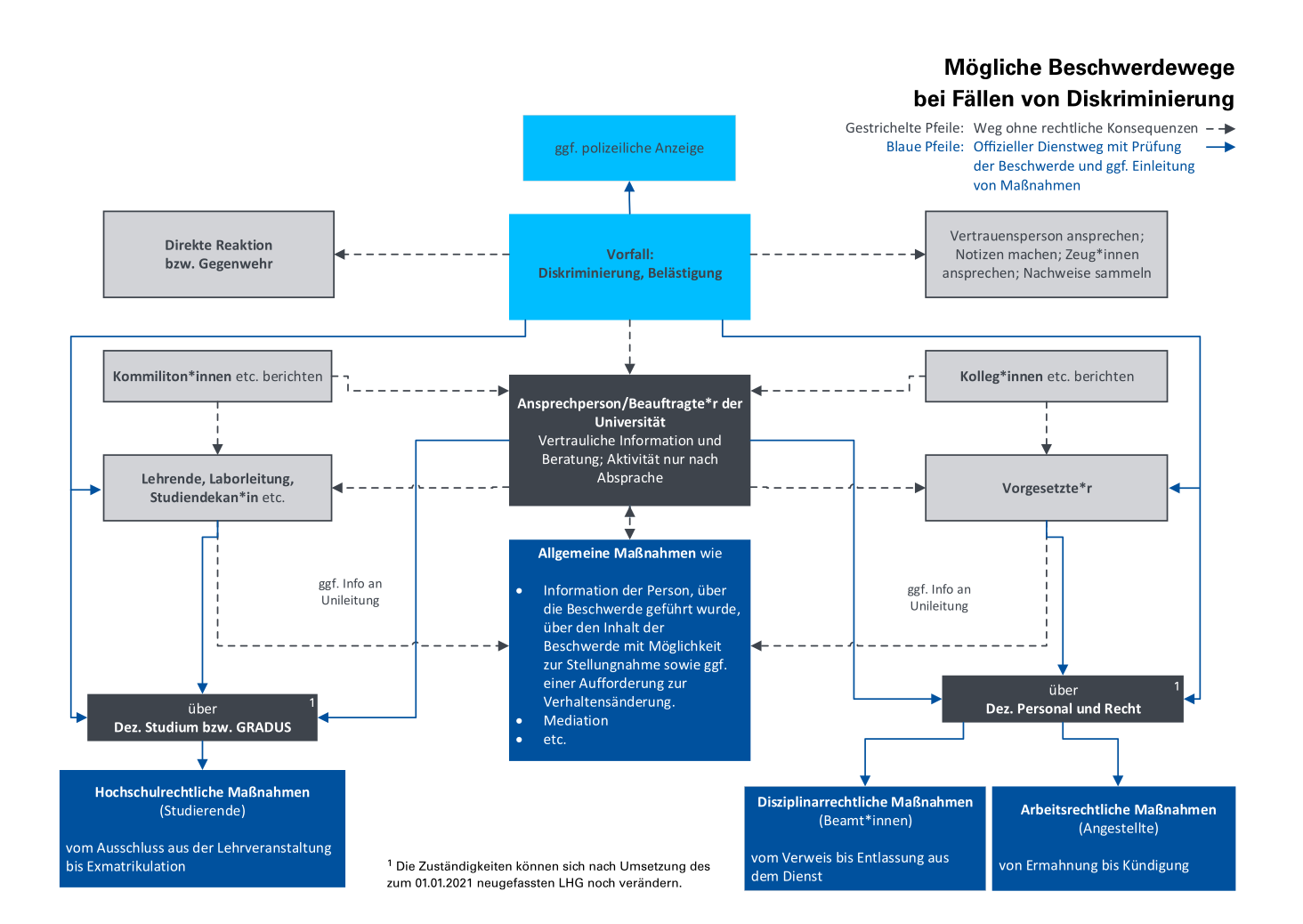
More information
- Guidelines
On handling incidents of discrimination, sexual harassment and sexual violence - Guidelines for persons affected by discrimination
- Guidelines for members of the management staff
- Guidelines for persons in the environment
Respect is smart
The University of Stuttgart is committed to ensuring respectful behavior in our daily interactions with each other.
You have rights!
- Basic Law for the Federal Republic of Germany (GG)
- General Law on Equal Treatment (AGG)
- Participation and Integration Act for Baden-Wuerttemberg (PartInTG BW)
- Law on Higher Education in Baden-Wuerttemberg (Landeshochschulgesetz — LHG)
- Law on the Realization of Equal Opportunities for Men and Women in Public Service in Baden-Wuerttemberg (Chancengleichheitsgesetz - ChancenG))
Together against discrimination
Discrimination is defined as the disadvantaging of a person on the basis of a certain characteristic without objective justification, as well as a degradation of the dignity and curtailment of the rights and freedoms of a person, which are inviolable according to the Basic Law.
Discrimination can occur on a number of levels:
- On a personal level,
- institutionally (due to legal inequalities, regulations, routines, etc.),
- structurally (entrenched disadvantage due to asymmetrically distributed resources, opportunities, etc.), and also
- by society as a whole (due to stereotypes, designations, etc.).
The goal of the University of Stuttgart is to prevent or eliminate discrimination.
What forms of discrimination are there?
The following forms of discrimination can be identified:
The following forms of discrimination can be identified:
- Direct discrimination,
- indirect discrimination,
- sexual harassment and assault,
- the instruction to discriminate against another person, and
- multiple discrimination.
Specifically, discrimination can take the following forms:
- Disparagement through verbal / written statements or through corresponding actions
- Unequal treatment
- Unfair working conditions
What can discrimination refer to?
Discrimination is not the fault of the person who is being discriminated against. Discriminatory behavior arises from real or perceived differences that one person perceives in another. Conscious or unconscious stereotypes, i.e. prejudices or simplifying presuppositions, play a decisive role. Disparagement or discrimination can occur in the following areas:
- Gender / sex
- National, ethnic, cultural background (ethnicity)
- Social background
- Health (handicap, chronic physical or mental illness)
- Age
- Sexual orientation
- Religion or worldview
Discrimination can have various consequences. Possible consequences are:
-
For those affected:
-
- Insecurity, feeling of powerlessness
- Loss of self-confidence, self-reproaches
- Psychological impairments and mental illness
- “Victim blaming“
- Gaps in CV (termination of university or doctoral degree studies or career termination)
- Costs (e.g. for legal advice, relocation, therapy)
- Loss of income
-
For the university:
-
- Teaching, learning, and work environments change for the worse
- Creative potential remains unused
- Projects remain unfinished
- Talents are lost
- A bad public image
- New talents are being put off
-
For society:
-
- People who discriminate against others feel endorsed and remain active
- People who discriminate against others are a (bad!) role model for young people Discriminatory behavior continues
- Discriminatory behavior divides society in the short, medium, and long term (non-material damage)
- There is economic (material) damage
What you can do about discrimination:
Person affected:
- React as quickly and firmly as possible.
- Write down what happened.
- Get help.
You can use the following complaint procedure:
- Step 1 (informal procedure)
- You can contact one of the relevant university offices and get confidential advice. If necessary, they will refer you to the appropriate person or support you in step 2.
- Step 2 (formal complaint procedure)
- You can lodge a written complaint [DE] with the relevant complaints office. The office will investigate the facts of the case and initiate further steps in the case of misconduct.
To file a complaint, please use the complaint form provided as a report aid. If you have difficulty filling out the complaint form, you may contact us by other means, such as email, with your complaint.
Leaders / managers
- Be a good role model.
- Make it clear that you do not tolerate discrimination.
- Don’t look away. Support those affected.
Personal environment:
- Support those affected.
- Organize help.
- Bring the problem to the attention of the relevant member of the teaching or management staff.
Possible complaint channels in the case of discrimination
 Possible complaint channels (PDF) [DE]. This document is not accessible. Please see below for an English text description.
Possible complaint channels (PDF) [DE]. This document is not accessible. Please see below for an English text description.
In the case of extreme discrimination or violence, persons affected can contact the police to have it checked whether the incident is a criminal offense. If this is the case, they can file a complaint.
At the University of Stuttgart, there are different contact persons and advisory offices for different forms of discrimination. You can contact them for a confidential interview. They will investigate the facts of the case and outline various options for action. No action will be taken without the consent of the person affected, except when other members and affiliates of the university need to be protected. In any case, the anonymity of the person affected will remain, unless otherwise agreed.
You can also contact members of the teaching staff (in the event of an incident in a course) or the management staff (in the event of an incident at the workplace).
After an initial confidential interview, various formal and / or informal approaches are possible.
Informal measures can include, for example:
- An interview with the offending person,
- a meeting between the person affected and the offending person in the presence of the contact person from the relevant advisory office / counseling center, and also
- the involvement of the person responsible from the teaching staff or the management staff.
If you do not wish informal measures to be taken or if these measures fail, formal measures can be taken.
The fist step of a formal procedure is the information and involvement of the relevant division (Division 3 - Students’ and Doctoral Affairs or Division 4 - Personnel and Legal Affairs), the Rectorate (if necessary), and the head of the respective institute or department where the incident occurred.
After reviewing the allegations, the relevant authorities will, if necessary, take further action against the offending person. Depending on the relevant regulations and the accused person’s position under employment, service, or university law, the following measures and sanctions may be taken:
- Formal interview with the offending person
- Oral or written instruction
- Written warning
- Transfer to another workplace (within or outside the university)
- Initiation of disciplinary proceedings and imposition of disciplinary measures (reprimands, fines, salary reductions, transfer, removal from service)
- Dismissal with or without notice
- Exclusion from a course
- Exclusion from the use of university facilities
- Unenrollment
- Ban on entering the university premises
- Reporting of an offense through the Rector of the university
If you do not wish to take part in the formal proceedings, you may refuse to do so or be represented.
In general, neither you as the person affected nor the supervisor or lecturer making the complaint may suffer any disadvantages as a result of the formal procedure. The same applies to all witnesses involved.
The costs-by-cause principle is the guiding principle for measures and sanctions.
University management is responsible for initiating and carrying out all formal proceedings.
Contact
- For the university's staff
(German only) - For students
Advice via Evermood
University members can use the Evermood platform to inform themselves in cases of conflict, crisis or discrimination and contact us, or external contact persons digitally, in person or anonymously.
Services of the university for raising awareness and the prevention of discrimination
Our thinking is often influenced by prejudices and preconceptions. Test how free you are from stereotypes.
- GRADUS
- Target group: doctoral candidates
- Institute for Diversity Studies in Engineering
- Language Center
- Target group: all members of the university
- Personnel development
- Target group: employees
- Professional School of Education
- Target group: students and lecturers of teaching degree programs
- Student representation
- Target group: students
- Stuttgart Center for Simulation Science
- Target group: members of SimTech
- uniqUS – Unit for Inclusive University Culture
- Target group: teachers, members of appointments committees
Further information
External contact points
with advisory function
- Federal Antidiscrimination Agency, Berlin
- Antidiscrimination Office of the State of Baden-Württemberg (LADS), Stuttgart [website in German only]
- Büro für diskriminierungskritische Arbeit Stuttgart – Office for antidiscrimination work in Stuttgart
- adis e.V. [website in German only]
Provider of professional anti-discrimination work in the Reutlingen/ Tübingen region and specialized agency on the topic of discrimination in Baden-Württemberg
Networks
- LAG Antidiskriminierungsberatung Baden-Württemberg [website in German only]
Association of existing and developing local counseling centers and networks against discrimination in Baden-Württemberg. - advd Antidiskriminierungsverband Deutschland, Leipzig [website in German only]
Umbrella organization of independent anti-discrimination offices and counseling centers, self-organizations and scientific institutions - Network “Antidiscrimination at Universities”
no website yet
Material
- Raising Antiracist Awareness: Strengthening Skills for Diversity in the Workplace,
online toolbox with knowledge and learning formats as well as concrete instructions for action, Charta der Vielfalt e.V.
Contact

Ulrich Eggert
Contact Person for Anti-Discrimination


